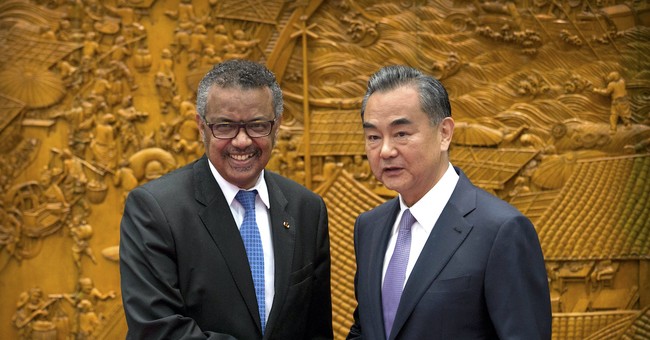 OK
OK On August 21, the director-general of the World Health Organization (WHO), Dr. Tedros Ghebreyesus, said, “We will not, we cannot, go back to the way things were.” The director-general was referring to life after the COVID-19 pandemic.
Yet, why would he make such a sweeping statement about life in a post-pandemic world? The simple answer: climate change, of course!
According to the director-general, “Throughout history, outbreaks and pandemics have changed economies and societies. This one will be no different. In particular, the pandemic has given new impetus to the need to accelerate efforts to respond to climate change. The pandemic has given us a glimpse of our world as it could be: cleaner skies and rivers. Building back better means building back greener.”
If the last sentence in his statement sounds familiar, it certainly should. “Build back better” also happens to be the theme of Joe Biden’s campaign. Coincidence? I think not.
Dr. Ghebreyesus went on to explain that, “In May, WHO published our ‘Manifesto for a Healthy and Green Recovery,’ with 6 policy prescriptions for protecting nature, investing in water and sanitation, promoting healthy food systems, transitioning to renewable energy, building livable cities, and stopping subsidies on fossil fuels. In July we added ‘actionables’ for each of these policy prescriptions, providing 81 concrete steps for policy-makers to build a healthier, fairer, greener world.”
First, when I see the word “manifesto” I automatically think of Marx and Engels. Could this be a Freudian slip?
And second, just out of curiosity, what does any of this have to do with coronavirus? Obviously, nothing.
Furthermore, why in the world is WHO deeply involved in crafting environmental policy during one of the worst pandemics in recent history? One would think WHO officials have enough on their plate already.
And to be blunt, WHO’s track record during the coronavirus outbreak has been less than stellar. After all, this is the same organization that sent mixed messages and believed the Chinese Communist Party’s lies about COVID-19 during the early days of the outbreak.
According to Ghebreyesus, “we have seen many examples of countries acting to protect lives, livelihoods and the planet on which they depend. Nairobi, Kenya is improving parks, adding urban forests, building more sidewalks and improving drainage. Pakistan has set up a ‘green stimulus’ scheme, offering laborers who are out of work as a result of lockdown a chance to earn money by planting trees. In the United Kingdom, the use of coal, the most polluting form of energy, fell to its lowest level in 250 years. Spain is becoming one of the world’s fastest decarbonizing nations, with 7 of the country’s 15 coal-fired power stations recently closed. Portugal has announced it will become coal-free by next year. Chile has committed to reducing air pollution and black carbon. Great cities such as Paris have committed to becoming ‘15-minute cities’, where every service can be easily reached by foot or bike, reducing air pollution and climate change.”
Once again, what does this have to do with combating COVID-19? Absolutely nothing.
Alas, Ghebreyesus let the cat out of the bag, when he said, “Hardship is always an opportunity to learn, to grow and to change. COVID-19 is a once-in-a-century health crisis. But it also gives us a once-in-a-century opportunity to shape the world our children will inherit—the world we want.”
And there you have it. It seems as if Ghebreyesus took a page from the Rahm Emanuel political playbook. In case you don’t recall, in 2008, Emanuel uttered this infamous phrase, “You never want a serious crisis to go to waste. I mean, it’s an opportunity to do things that you think you could not do before.” In this case, Emanuel was referring to the 2008 recession as an “opportunity” for his boss, President Obama, to do “things” that would have been considered unimaginable in “normal” times.
The point is that WHO is attempting to use the “opportunity” of a worldwide pandemic to usher in a spate of climate change policies that have absolutely nothing to do with combating COVID-19. The only thing more vexing than WHO’s pivot to climate change during the midst of the current pandemic is their reluctance to call-out the greatest emitter of greenhouse gases, which is China.
Apparently, WHO officials, including the director-general, are more concerned with appeasing the Chinese Communist Party and environmental zealots, than they are about addressing the coronavirus outbreak. Talk about a dereliction of duty.
Chris Talgo ([email protected]) is an editor at The Heartland Institute.



